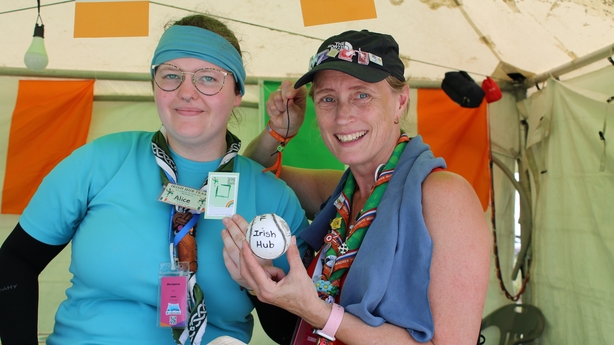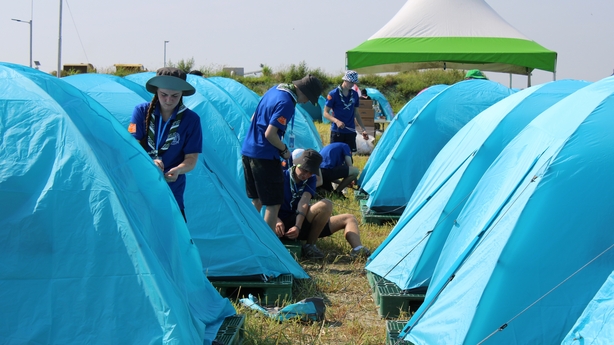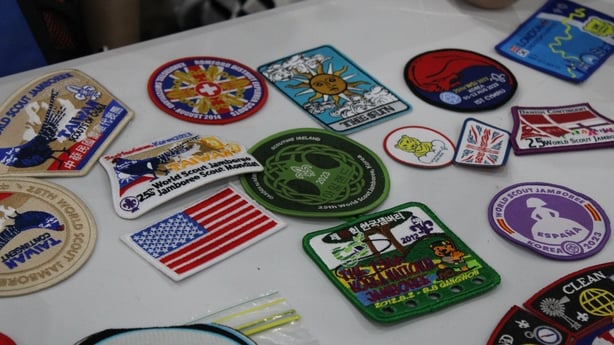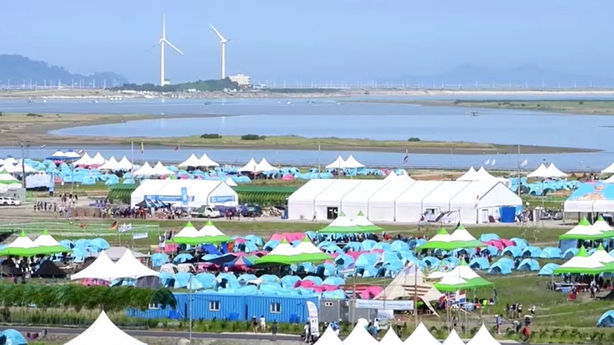A small number of scouts from Ireland were among at least 600 people treated for heat-related issues during a global jamboree, which is under way in South Korea.
Thousands of scouts at the event will receive more water trucks, air conditioned spaces and medics, officials said, after hundreds of the teenage participants fell ill this week due to unusually hot weather.
A spokesperson for Scouting Ireland said that five scouts - two young people and three adults - who travelled to South Korea as part of a 222-strong contingent, were treated after feeling unwell, but all have fully recovered.
Scouting Ireland said 144 scouts under the age of 18, along with 78 adults, are in South Korea for the jamboree.
The spokesperson said the quality of care in the on-site medical clinics has been excellent and none of the Irish scouts needed long-term, overnight or off-site treatment.
A statement from Scouting Ireland said: "A joint decision has been made by Scouting Ireland to assess the situation in Korea on a daily and as-required basis.
"If we need to move our participants, we will. At this time though they are enjoying the WSJ, being kept safe, healthy and happy – as far as is practicable.
"We will reassess the situation in the next 24 hours."

He said the heat in South Korea at the moment would be challenging for any Irish person, but the group is managing well.
He added that Scouting Ireland is confident that the extra measures introduced by the jamboree's organisers will "ensure the ongoing health and safety of all our scouts".
Speaking on RTÉ's News at One, Chief Scout of Scouting Ireland Jill Pitcher Farrell said that while the conditions in Korea are "unprecedently hot", the Irish cohort were prepared for this.
She said: "The last two World Scout Jamborees have been in places that were much hotter. In 2015, we were in Japan and in 2019 we were in West Virginia.
"So, a lot of our adults were kind of ready for these conditions in the sense that we knew what being on a hot jamboree would be like."
The five scouts were treated primarily due to dehydration, as the jamboree involves a lot of physical activity.
"There is a lot of sweating basically and as a result some of the young people have become dehydrated," Ms Pitcher Farrell said.
"But it is really important that our scouters look out for that, and they do bring them to the medical tent as soon as possible."

She added that there is a huge focus on rehydrating, getting into the shade, wearing hats, and wearing sunscreen.
"Everyone else is just taking shade on site basically and taking rest during the sunny hours of the day, remaining in the cooler areas," Ms Pitcher Farrell said.
"As well as that there has just been a huge amount of air-conditioned buses brought on site which are allowing for more areas for rest and recuperation as it is slightly hotter than even the Koreans expected it to be."
The event coincides with the highest heat warning by authorities in four years, as temperatures in some parts of the country topped 38C this week.
"The government will use its all resources to ensure that the jamboree can end safely amid the heatwave," Prime Minister Han Duck-soo told a special cabinet meeting called by the president to approve spending 6 billion won (€4.1m) to support the jamboree.
Some 39,000 participants from 155 countries, most of them scouts aged between 14 and 18, including a contingent from Scouts Northern Ireland, are at the event.

A Reuters reporter saw several scouts being stretchered off into a treatment room as temperatures reached as high as 34C in Saemangeum, the area of reclaimed land in Buan where they are camping.
Emergency services had earlier said most of those who fell ill due to the heat had mild symptoms.
With the heatwave forecast to last until next week, some activists and parents have questioned the viability of the jamboree, the first global gathering of the scouts since the pandemic.
Organisers said they were modifying the schedule depending on the temperature, adding that the scouts remained resilient.
"Despite the heat and the difficulties and the challenges that they are facing, only 8% reported that they were very unsatisfied with the experience so far," Jacob Murray, the director for World Events at the Scouts, told reporters.
"We are grateful to the Korean government and provincial government for providing additional resources."

The jamboree comes a few weeks after the government of President Yoon Suk Yeol was criticised for its handling of floods that killed more than 40 people.
Some residents of Buan said the government should have been better prepared for the heat.
Earlier today, Mr Yoon called for an "unlimited" supply of air-conditioned buses and water trucks to be sent to the jamboree.
A day earlier, he ordered dozens of military doctors and nurses to go to the campsite to provide emergency care. The event is due to run until 12 August.
British children attending the World Scout Jamboree in South Korea have been moved to hotels after young people were treated for heat-related illnesses amid one of the country's hottest summers.
The UK Scout Association, which is the largest contingent there, said young people and adult volunteers will be moved to hotel accommodation in the country's capital Seoul over the next two days to help "alleviate the pressure" on the site.
It said in a statement: "We know that may be a disappointment for some and we will continue the Jamboree experience in Seoul, working with Korean authorities on a programme of activities so our young people still get the most from their time in Korea.
"Young people will travel home as originally planned from 13 August."

